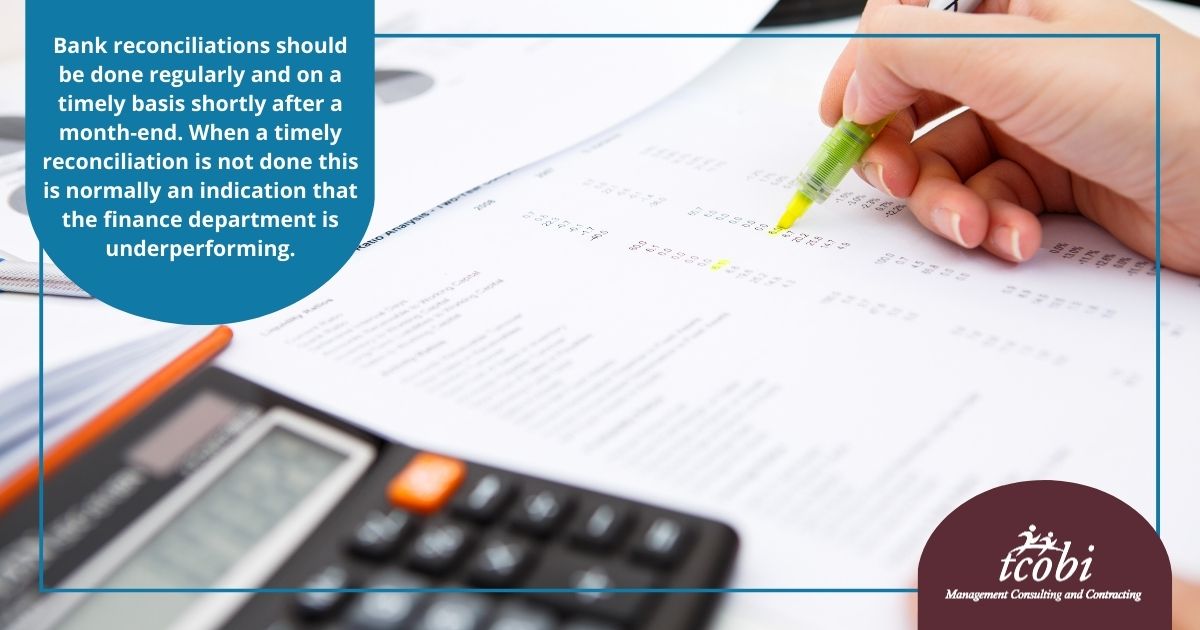Those in leadership and executive positions are always there when those…

Why a Bank Rec Is Important and a Sign of Potential Under Performance
In the past four decades, tcobi has worked with over 80 organizations, including 23 not-for-profit organizations in local communities. Many times, we are called in when a transition is taking place with one accountant leaving and another coming onboard or when the finance leader is about to leave or has already left the organization. Sometimes we are called when the Executive Director is not comfortable with what they are seeing and ask us in to do a diagnostic review and offer a second opinion. Unfortunately, in many situations, we find that the finance leader has been under performing in some way. As we complete our work, a similar question often comes from the Executive Director: How could they have known of this potentially damaging underperformance sooner?
Some specific examples of other such statements I have heard in the past include:
- “My finance leader was a CPA. I thought I could rely on those letters to ensure that they were doing bank reconciliations. I thought I did not need to check, I guess I was wrong. I won’t make that mistake again.”
- “Maybe I should add bank reconciliations to the monthly attestation report that my finance leader signs off on. My outgoing finance leader said that things were done but they refused to sign the attestation, I wonder why that was?”
- “I reviewed the bank reconciliations and there were many outstanding items, but they never seem to clear. They just seem to get added to each month and the reconciliation seemed more and more complicated each month. I guess that was a problem, wasn’t it?”
- “I trusted my finance role leader. I did not think that I need to check on what they were doing.”
- “I am not a finance person myself so how can I check on a bank reconciliation if I don’t know what one looks like?”
I will list the top 10 signs of an underperforming financial leader in a subsequent blog. Today I will begin at the beginning with some guidance on how a review of bank reconciliations can either give members of the leadership team some assurance of good performance or can provide some evidence that performance could be improved.
A layman’s definition of a bank reconciliation is when the transactions recorded on a company’s bank statement are compared to the transactions recorded in its books or accounting record (most often known as a general ledger). Every accountant is trained on how to do a bank reconciliation as well as understanding how important and essential a proper reconciliation is. Bank reconciliations should be done regularly and on a timely basis shortly after a month-end. When a timely reconciliation is not done this is normally an indication that the finance department is underperforming.
Why is a bank reconciliation a leading indicator of under performance? Because it is the first and last thing a company does to prove that its accounting records are correct. If you have a good process of recording your accounting transactions, bank reconciliations are easy and straightforward to do. Reconciliations are less easy to complete and unlikely to be completed properly if:
- A company’s financial processes are not in good shape, well defined, or well designed.
- A company’s financial processes are not being done on a timely basis.
So, if there is one thing you can check easily, it is to review the bank reconciliations that your finance leader is responsible for. You don’t have to review every single reconciliation, but you should ask if these reviews are being done. Better still, you should have your finance leaders sign off monthly that they are up to date. And most importantly you should review them on a periodic basis. This also means that you should understand, at least at a high level, what you are looking for.
The basic guidelines for review bank reconciliations include the following:
- Should be done by someone independent from the accounts payable and accounts receivable departments.
- Should be done by someone who does not have the ability to authorize bank transactions or, at least, by a second party, if full segregation of duties is not possible.
- Should be done monthly, shortly after the month-end. Can be done weekly or even daily, if that is useful in keeping up to date. If a monthly reconciliation is not being done, you have no assurance that your accounting records are accurate. Expenses could be missed. Revenues could be missed.
- Should be attested by the finance leader as being complete and correct.
- Should be periodically reviewed by the supervisor of the finance leader.
If you are not familiar with the more in-depth specifics of bank reconciliations, I will have a separate blog on our website where we give specific details of what a good bank reconciliation looks like and what a poor bank reconciliation looks like. If your finance leader cannot produce and explain any type of bank reconciliation, then you know you have issues.
Remember: A good accountant can explain any accounting process to a non-accountant, if the accountant understands what they are doing themselves. A teacher cannot teach a subject well if they do not understand it themselves. Any accountant should be able to teach you what you need to know about a bank reconciliation.
What should you do?
So, what do you do if bank reconciliations are not being done in your organization? You should certainly address the situation with your finance leader and understand why they are not being done. If this is the case, you should work together to come up with a plan to have them done on a timely basis. I had a Director of Finance, a CPA, tell me to my face that the reason they did not do a monthly bank reconciliation is that they were planning to do it at year end. That was my confirmation of financial under performance and showed how that CPA was rationalizing why they were not doing their job.
When we are called into a company to evaluate the financial processes, the first thing we check is are the monthly bank reconciliations being done and are they being done correctly. That one test often identifies under performance immediately. However, there are other leading indicators of underperformance that we will discuss in subsequent blogs.
Evidence of underperformance of your finance leader or finance department does not mean that anyone should be immediately terminated, of course. Under performance is a symptom of an underlying condition that needs to be diagnosed, discussed, agreed-upon, and treated. Education, training, coaching, and mentoring might each be useful. Tcobi is often contracted to do the financial reporting of an organization on a monthly basis and through that reporting, we can immediately identify if there are any issues with the recording of financial transactions by the company‘s finance department.
I knew personally of a situation with a public company where monthly bank reconciliations were being done but they were not being done properly. It was eventually discovered by the internal audit department of that company. The result was write-offs of millions of dollars and a multi month project to do bank reconciliations properly and catch them up to date. The finance leader responsible for doing and reviewing those bank reconciliations should have known better. This is just one example to show that financial underperformance due to incorrect or incomplete reconciliations can happen to anyone.



